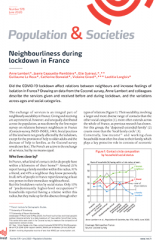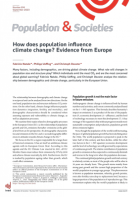
Neighbourliness during lockdown in France
Population and Societies
n° 578, June 2020
Did the COVID-19 lockdown affect relations between neighbours and increase feelings of isolation in France? Drawing on data from the Coconel survey, Anne Lambert and colleagues describe the services given and received before and during lockdown, and the variations across ages and social categories.
Be it in normal times or in a crisis, exchanges of services between neighbours are subject to the same laws of sociability. People in higher-level occupations make up for the geographical dispersion of their family through more frequent relations with neighbours and feel less isolated than other social categories. During the lockdown to control the spread of COVID-19, the proportion of individuals exchanging services with neighbours remained stable, but attention focused on the over-75s at the expense of families. People aged 60–74, habitually the most neighbourly age group, exchanged even more services during the crisis. In one respect, however, the lockdown produced a radical change: the exchange of services did nothing to prevent a sharp increase in the sense of isolation.








